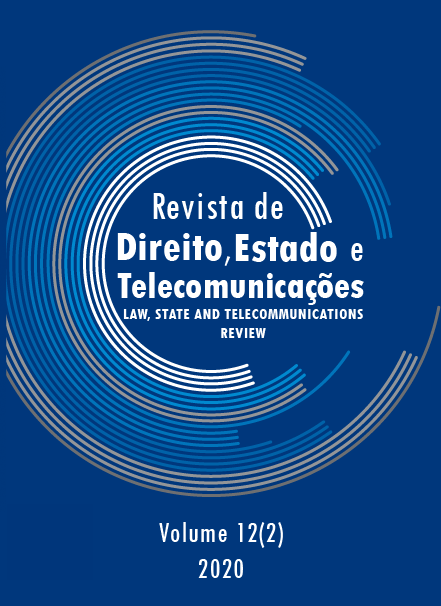The Legal Status of the National Data Protection Authority in light of the Regulatory State Theory
Is there any room for the adoption of the material concept of administrative decentralization in Brazil?
DOI :
https://doi.org/10.26512/lstr.v12i2.34714Mots-clés :
Regulatory Agencies. Regulatory State Theory. National Data Protection Supervisor. Legal Nature. Material Administrative Decentralization.Résumé
Purpose ”“ The purpose of this paper is to investigate the adequacy of the legal nature of the National Data Protection Authority (ANPD), proposed by Law no. 13.853/19, to the reality of Brazilian Law, starting from the theoretical bases developed by the Regulatory State Theory regarding the valorization of the technical decision immune to political influences.
Methodology ”“ This study adopts the doctrine revision of the Regulatory State Theory, aiming to point the theoretical bases on the autonomy of the regulatory entities, in order to make the comparison of adequacy between the legal nature of the ANPD placed in Law no. 13.709/18 and the material concept of administrative decentralization.
Findings ”“ The study demonstrates that the Brazilian legal-political tradition will make it difficult for the National Data Protection Supervisor to act in view of its legal nature as a public body that is part of the structure of the Presidency of the Republic, which greatly relativizes its autonomy.
Practical Implications ”“ The probable revision of the legal nature of the ANPD, as provided for in art. 55-A, §1, of Law no. 13.709/18, and the effectiveness of the performance of this National Authority.
Originality ”“ A very current issue in the Brazilian legal environment is the suitability of the companies that will be affected by the entry into force of the General Data Protection Act (Law no. 13.709/18) in August 2020, due to the comprehensive potential of this law. This paper studies the legal nature of the National Data Protection Authority, a regulatory body that will have a relevant regulatory role in the data economy society, highlighting the relevance of the study to the sector.
Références
AMARAL, D. F. do. Curso de Direito Administrativo. 4ª ed. Coimbra: Almedina, 2015.
ARAGÃO, A. S. de. Agências Reguladoras e a Evolução do Direito Administrativo Econômico. 3. ed. Rio de Janeiro: Forense, 2013.
ARANHA, M. I. Manual de Direito Regulatório: Fundamentos de Direito Regulatório. 4. ed. rev. ampl. London: Laccademia Publishing, 2018.
BANDEIRA DE MELLO, C. A. Curso de Direito Administrativo. 31 ed. rev. e atual. São Paulo: Malheiros, 2014.
BRASIL. Lei nº 13.709, de 14 de agosto de 2018. Disponível em: <https://bit.ly/2Zz5Wpg>. Acesso em 13 out. 2019.
CARVALHO FILHO, J. dos S. Manual de Direito Administrativo. 27. ed. rev., ampl. e atual. São Paulo: Atlas, 2014.
CUÉLLAR, L. Introdução à s Agências Reguladoras Brasileiras. Belo Horizonte: Fórum, 2008.
FLORENÇO, L. B. A proteção de dados pessoais nas relações de consumo como um direito fundamental: perspectivas de um marco regulatório para o Brasil. Revista da ESMESC, v. 23, n. 29, 2016.
FURTADO, L. R. Curso de Direito Administrativo. 5ª ed., rev. e atual. Belo Horizonte: Fórum, 2016.
HARARI, Y. N. 21 Lições para o Século 21. 1ª ed. São Paulo: Companhia das Letras, 2018.
JUSTEN FILHO, M. O Direito das Agências Reguladoras Independentes. São Paulo: Dialética, 2002.
LOPES, O. de A. Fundamentos da Regulação. Rio de Janeiro: Editora Processo, 2018.
MARQUES NETO, F. de A. Agências Reguladoras Independentes: Fundamentos E Seu Regime Jurídico. Belo Horizonte: Fórum, 2005.
MARTIAL-BRAZ N. O direito das pessoas interessadas no tratamento de dados pessoais: anotações da situação na França e na Europa. Revista de Direito, Estado e Telecomunicações, v. 10, n. 1, p. 85-108, 2018.
MEIRELLES, H. L. Direito Administrativo Brasileiro. 40. ed. atual. São Paulo: Malheiros, 2014.
OLIVEIRA A. C. B. de. As agências reguladoras e o modelo constitucional brasileiro. Journal of Law and Regulation, v. 4, n. 1, p. 131-150, 2018.
PESTANA, M. Direito Administrativo Brasileiro. 4. ed. Rio de Janeiro: Atlas, 2014.
ROCHFELD J. Como qualificar os dados pessoais? Uma perspectiva teórica e normativa da União Europeia em face dos gigantes da Internet. Revista de Direito, Estado e Telecomunicações, v. 10, n. 1, p. 61-84, 2018.
RUAS C. A insuficiência da estruturação da independência orgânica das agências reguladoras federais contra a interferência político-partidária. Journal of Law and Regulation, v. 5, n. 1, p. 115-130, 2019.
SUNDFELD, C. A. Direito Administrativo Econômico. 13. ed. São Paulo: Malheiros, 2005.
Téléchargements
Publié
Numéro
Rubrique
Licence
© Law, State and Telecommunications Review 2020

Cette œuvre est sous licence Creative Commons Attribution 4.0 International.
By submitting this paper to the Law, State and Telecommunications Review,
I hereby declare that I agree to the terms of the Creative Commons Attribution 4.0 International (CC BY 4.0).


